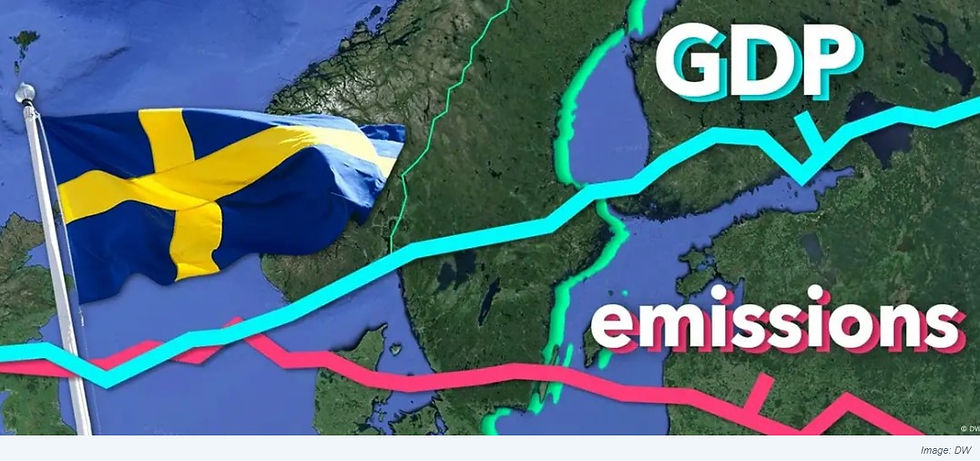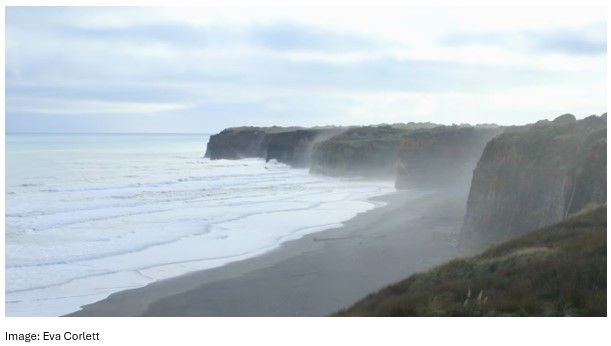The overshoot myth: you can’t keep burning fossil fuels and expect scientists of the future to get us back to 1.5°C
- CarbonEES
- Aug 29, 2024
- 6 min read
Our latest selection of articles from New Zealand and around the world on environmental management and sustainability. Click here to subscribe.
SnippETS this week explores the myth of overshoot and takes a look at how limiting warming to 1.5 degrees may seem like a laudable goal but can also be a barrier to more innovative and aspirational responses to climate change. Long before goals of 1.5 degree's were discussed Sweden was though well ahead of the game and has made progress far ahead of most other countries with innovation, coordination, financial incentives and disincentives aligned to drive positive and enduring change.
Climate change is also reshaping the way we chose to travel with the possibility of hydrogen powered trains becoming closer to reality, though as is often the case with hydrogen power, the production of green hydrogen remains the major obstacle. The types of travel experiences we choose - with colocations and the timing of our travel to avoid heat becoming necessary - are changing our travel patterns which requires us to rethink how we can meet these different demands and deliver meaningful experiences that balance the need for visitor education and environmental protection.
The increasingly urgent need for a coordinated approach to global climate policy is highlighted by the need for alignment of policy between Australia and Japan to manage their differing approach to Australian gas exports and the production and export of LNG from Japan. While nations independent policies may in isolation appear laudable, these can often be cancelled out by what happens beyond ones borders with unintended consequences and a disconnect between where a policy is created and an outcome occurs.
Closer to home, more traditional Te Ao responses and unlikely environmental alliances are to the forefront as local communities grapple with climate adaptation and the renewed push to drill for gas and open up the sea floor off the Taranaki coast to mining. Meanwhile, our current coalition Government speaks of economic security while kicking the climate change can down the road and ironically, imperiling our economic security by delaying credible responses to the climate crisis as evidenced by the recent Climate Change Commission review of our response to climate change adaptation.
Looking for a software tool to measure and reduce your emissions? We've got tips to help you choose.
Here is the full list of articles...
The panic over limiting warming to 1.5°C might seem overblown at times, especially given the everchanging nature of the weather. But you can’t turn back time. The threshold is not an on/off switch, the cascade of events which follow each fraction of a degree will be myriad, dire, and difficult to trace. So how is it that we believe that we must limit warming, and we must continue to rely on fossil fuels? One cannot be true alongside the other, yet our conviction that it is so leads back to a core falsehood: the overshoot. Read more…
Don’t let any government tell you it’s too hard to reduce emissions and still have economic growth. Sweden has cut 80% of its net emissions since 1990. while growing its economy twofold. When the global oil crisis hit in the 1970’s Sweden made plans to reduce its dependency on foreign oil. By building nuclear power station capability, the country also had options for hydro and wind power and lots of trees, which help capture and store CO2. United policy from different political parties has also helped. Read more…
Hydrogen trains are gaining traction in Europe and North America. Trains operating in Germany have already racked up 220,000 km of daily operation. They have advantages over diesel trains, they could help reduce CO2 emissions by up to 89% on some routes. They also have advantages over battery electric trains, it only takes 15-20 minutes to refuel a hydrogen train, and they can travel up to 1,000 km on a tank of hydrogen while only emitting water vapour from the ‘tail pipe’. Read more…
Thinking of going travelling any time soon? Ecotourism is the act of travelling responsibly to natural areas that conserve the environment, sustain the well-being of indigenous populations, and that promote environmental awareness through personal experiences. This style of tourism has been booming lately, as people seek adventures that allow them to connect with nature and support conservation efforts. As the sustainable travel industry approaches its projected $829.8 billion valuation, the challenge will be to ensure that this growth truly leaves a positive footprint on the planet for generations to come. Read more…
While we’re on the topic of travel, wildfires and heatwaves in summer have pushed tourists further away from the equator towards cooler locations, such as Norway, Sweden and Alaska. Airfares and accommodation companies have noted a 15 percent increase in searches for summer stays in these Northern countries. There has also been an upwards trend of tourists travelling during shoulder seasons, Autumn and Spring. While this is good news for the tourism industries in these countries, there are concerns that there won’t be enough workers during these periods to meet demand. Read more…
Māori in New Zealand are revitalising traditional practices to combat climate change, which is eroding their lands and threatening their culture. Through conservation projects involving reforestation, predator control, and marine protection, they aim to restore the natural ecosystem. Initiatives like Whale Watch Kaikōura and the Dark Sky Project blend Māori wisdom with modern science to preserve biodiversity and cultural heritage. Despite challenges from government policies and climate impacts, the Māori continue to advocate for environmental stewardship, highlighting their deep connection to the land, sea, and sky. Read more…
A contentious plan to mine iron sands off New Zealand’s Taranaki coast has sparked fierce opposition from local communities, environmental groups, and indigenous iwi. Trans-Tasman Resources (TTR) has faced years of legal challenges over its proposal, which critics argue threatens marine ecosystems, including rare species like the Māui dolphin. Although TTR claims its mining methods are environmentally sound, opponents fear significant ecological damage. The government's push to fast-track such projects, despite widespread opposition, has heightened tensions, with locals vowing to continue their fight. Read more…
Japan's investment in foreign renewables has supercharged Australia's green transition. However, Japan's plans for the Asia-Pacific have led to a tightening of the reigns. Liquefied Natural Gas (LNG), which could soon be introduced to NZ, is one of Japan's primary imports from Australia. While the Australian government proclaims ambitious transition plans for its exports, Japanese investors may impede those efforts. How will Australia toe the line between emissions reduction and foreign interests? Read more…
The Climate Change Commission says New Zealand is not adapting to climate change fast enough. Commission chair Dr Rod Carr said the report showed urgent action was needed to address the impacts of climate change on New Zealanders' lives and livelihoods. "We are already seeing a significant toll. In the 2022-2023 financial year, we saw almost $4 billion in insurance claims due to extreme weather events. It's estimated the cost of damage to physical assets from the Auckland Anniversary weekend floods and Cyclone Gabrielle will be up to $14.5 billion." Read more…
Officials have warned Climate Change Minister Simon Watts of a cost blowout if the government does not get moving on signing international climate deals. To meet its international commitments, the government needs to secure almost 100 million tonnes of carbon dioxide savings from other countries before 2030, to top up savings inside the country by transport, industry and other emitters. Furthermore, delaying buying these international offsets until closer to 2030 would be expected to see the price rise to five times the cost they could be bought for today. Read more…

This week we have the following innovation articles we hope you find interesting:
Hydrology Report - 29 August 2024

Electricity Price Index - 29 August 2024
Click here to subscribe to SnippETS
Did you know: You can display your organisation’s sustainability data on your website or intranet using our carbon management software, e-Bench? Read more…
Copyright of all featured articles lies with the original authors





























Comments